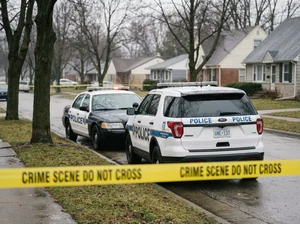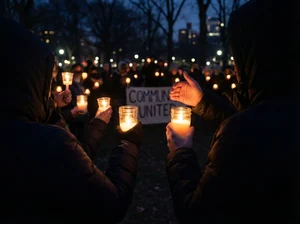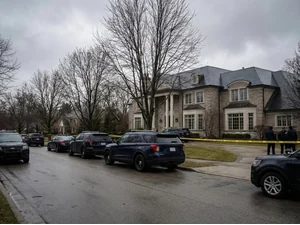
Death Row's Oldest Inmate Finally Put to Death
By Nikki Thrace. Jul 30, 2025
Richard Jordan waited nearly half a century for the state to carry out its sentence. On June 25, 2025, the 79-year-old was executed by lethal injection at Mississippi State Penitentiary for the 1976 murder of Edwina Marter — ending one of the longest legal sagas in the history of capital punishment in the U.S. Jordan wasn’t just Mississippi’s oldest death row inmate — he was its longest-serving. His death closed a decades-long chapter filled with courtroom battles, retrials, legal appeals, and emotional strain for both his family and the family of the woman he murdered.
The Murder That Started It All
On Jan. 13, 1976, Jordan called Gulf National Bank in Gulfport, Mississippi, asking to speak with a loan officer. He was directed to Charles Marter. That same day, Jordan used a telephone book to find the Marters’ address and drove there, posing as an electrician.
Inside the home was Edwina Marter, a 35-year-old mother of two, alone with her 3-year-old son. Jordan held her at gunpoint and abducted her. He later drove her to a wooded area near DeSoto National Forest, where he fatally shot her in the back of the head. Afterward, Jordan called her husband and demanded $25,000, falsely claiming she was still alive.
Authorities arrested him the next day in Mobile, Alabama. Over the next 49 years, Jordan was sentenced to death four separate times as his case ricocheted through the courts.
Loading Tweet...
Why It Took Nearly 50 Years
The reason for the delay? A tangled web of legal challenges and retrials. Over the years, Jordan appealed his conviction multiple times, arguing that key evidence and mitigating circumstances, specifically his mental state and military history, were never properly considered by the courts.
Jordan was a Vietnam War veteran who served three tours of duty and, according to his legal team, suffered from untreated post-traumatic stress disorder. His lawyers said PTSD played a significant role in his crime and argued that it should have been considered during sentencing. They also claimed he never received access to an independent mental health expert, a right recognized by the courts years after his original trial.
Mississippi officials, however, stood by the ruling. In May 2025, the state Supreme Court issued Jordan’s final execution order. The U.S. Supreme Court, the Fifth Circuit Court of Appeals, and the governor’s office all declined to intervene.
Final Hours on Death Row
Execution procedures began at 6 p.m. on June 25. Jordan received a sedative, followed by two additional drugs that caused paralysis and cardiac arrest. He was pronounced dead 16 minutes later.
Before the drugs were administered, Jordan delivered a final statement.
“First I would like to thank everyone for a humane way of doing this,” he said, according to the Associated Press. “I want to apologize to the victim’s family … I will see you on the other side, all of you.”
Witnesses to the execution included his wife, Marsha Jordan, and his attorney. Mississippi’s corrections commissioner noted that Jordan had spent time with his family that day and shared a final meal.
Loading Tweet...
The Victim’s Family Speaks Out
The Marter family, who lived nearly five decades with the pain of Edwina’s loss, attended the execution and later released a public statement.
“Nothing will bring back our mom, sister, and our friend,” a family spokesperson read, according to PEOPLE. “Nothing can ever change what Jordan took from us 49 years ago. Jordan tried desperately to change his ruling so he could simply die in prison. We never had an option. He took Edwina’s life, never thought about the many people who loved her and relied on her.”
Her sons, now in their 50s, missed decades of moments with their mother — birthdays, graduations, weddings. One of them, Eric Marter, told the Associated Press, “It should have happened a long time ago … I’m not really interested in giving him the benefit of the doubt.”
A Case That Still Divides
Richard Jordan’s death brings closure to a case that has divided public opinion for years. Supporters of his execution argue that justice was finally served. Opponents point to Jordan’s military service, PTSD, and exemplary behavior during his time behind bars as reasons he should have been allowed to live out his remaining years in prison.
He was one of just 22 people nationwide still on death row for crimes committed in the 1970s. Mississippi has 36 inmates remaining on death row today.
While Jordan’s execution marks the end of a legal journey, it leaves behind questions about how — and how long — the state should carry out capital punishment. For the Marter family, though, one thing is clear: nearly 50 years is a long time to wait for justice.
References: Longest-Serving Man on Miss. Death Row Executed for 1976 Murder: ‘Should Have Happened a Long Time Ago,’ Victim’s Son Says | Mississippi Executes the Longest-Serving Man on the State’s Death Row for 1976 Killing | Richard Jordan Executed After Nearly 50 Years on Death Row
The Bold Fact team was assisted by generative AI technology in creating this content
Trending

Earn Massive Cash Back With This Card
Sponsored

Police Say Tools Were Ordered After Alleged Murder
Taylor Bennett

The Dumb Money Mistake You’re Probably Still Making
Sponsored

Man Convicted in 2001 Murder of UGA Law Student Tara Baker
Dana Whitfield

These 14 Benefits Could Save Seniors Thousands
Sponsored

Toddler Survives After Mother Shot 15 Times
Jordan Reyes

7 States Where Retirees Can Stretch Their Savings in 2026
Dana Whitfield

American Idol Alum Charged With Killing Wife, Faking Burglary
Alex Morgan

No Body, No Verdict Yet in Manassas Case
Jordan Reyes

Katy Perry and Justin Trudeau's Relationship Appears to Be Getting More Serious
Jordan Reyes

AARP Names 10 Affordable Cities for Seniors in 2026
Jordan Reyes

Three Children Left Behind After 2023 Disappearance
Alex Morgan

Four Men Declared Innocent in 1991 Austin Yogurt Shop Murders After 33 Years
Jordan Reyes

Former NFL Linebacker Darron Lee Charged With Girlfriend's Murder
Dana Whitfield

South Carolina Woman Accused of Slaughtering Four Family Members Now Stands Trial After Pleading for Killer to Come Forward
Taylor Bennett

Missing 24-Year-Old Discovered in Michigan Woods
Dana Whitfield

Police Say Multiple Victims in Little Elm Case
Taylor Bennett

How Retirees Are Turning Experience Into Income in 2026
Taylor Bennett

Kentucky Woman Reunited With Father 40 Years After Abduction
Dana Whitfield

New Jersey Man Convicted of Killing Brother's Family in 2018 Mansion Murders
Jordan Reyes

North Carolina Mother Found Alive 24 Years After Christmas Shopping Trip
Alex Morgan

Missing Woman's Body Discovered in Kitchen Freezer
Jordan Reyes

Blake Lively and Justin Baldoni Head to Trial After Settlement Talks Fail
Alex Morgan

Brooklyn Beckham Addresses Rift With Parents in Public Statement
Taylor Bennett